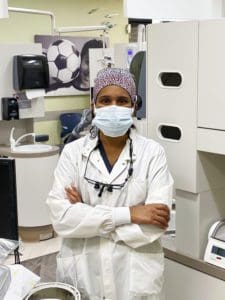
Khushbu Gopalakrishnan, DDS
When overcoming challenges becomes the norm, it’s easy to overlook extraordinary accomplishments. That’s especially true for our health care workers. As shelter-in-place orders took effect in mid-March of 2020, when nearly everything closed and everyone was at home, Marin Community Clinics’ dental team were preparing for work. While two of our three dental clinics were temporarily shuttered, the San Rafael Dental Clinic remained open for emergency visits and limited services – an incredible feat given the circumstances.
Due to the up-close and personal nature of dentistry, it is historically one of the riskiest professions in terms of potentially contracting or spreading infectious diseases. In many ways, that worked in the team’s favor: Infection control is something dentists, hygienists, and dental assistants are accustomed to; but COVID-19 is different. “We had to take into account that this was uncharted territory – a new virus – and we needed to follow the best guidelines and create our own workflows in phases,” said Chief Dental Officer Connie Kadera, DDS.
While so much was unknown at the time, we knew that COVID-19 was transmitting through droplets and aerosols, which are commonly produced during dental procedures. “Our mission became protecting both our staff and patients,” explained Dr. Kadera. With safety being the number one priority, and following strict guidance from the State of California and agencies such as the American Dental Association and the Centers for Disease Control and Prevention, the dental team went to work. In doing so, they remarkably paved the way for the rest of the organization.
“I felt strongly that it was important to push ahead and continue our work of completing patients’ dental treatment in a timely manner,” explained Khushbu Gopalakrishnan, DDS. Still, it was far from business as usual. Opening safely meant implementing and adhering to strict PPE protocols, following new procedures around disposing of equipment after aerosolization, social distancing, COVID-19 screening measures, and more. By keeping the clinic operating, the team prevented unnecessary visits to overwhelmed emergency rooms, and were eventually able to safely ramp up more routine services starting in July of 2020. Most importantly, they were there for those that were in serious pain that had nowhere else to turn.
